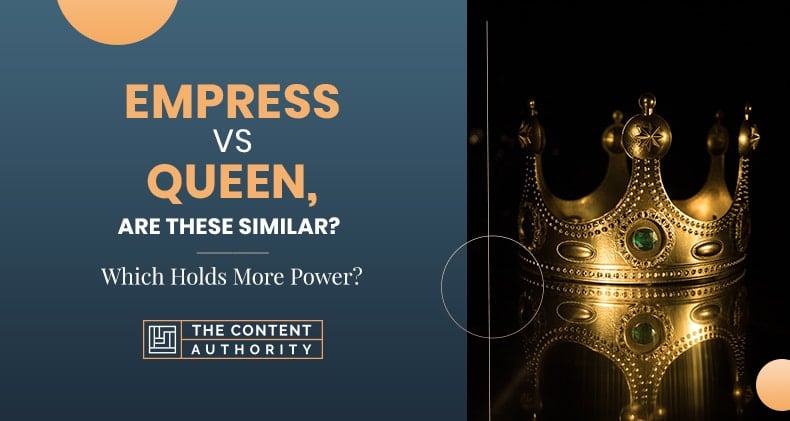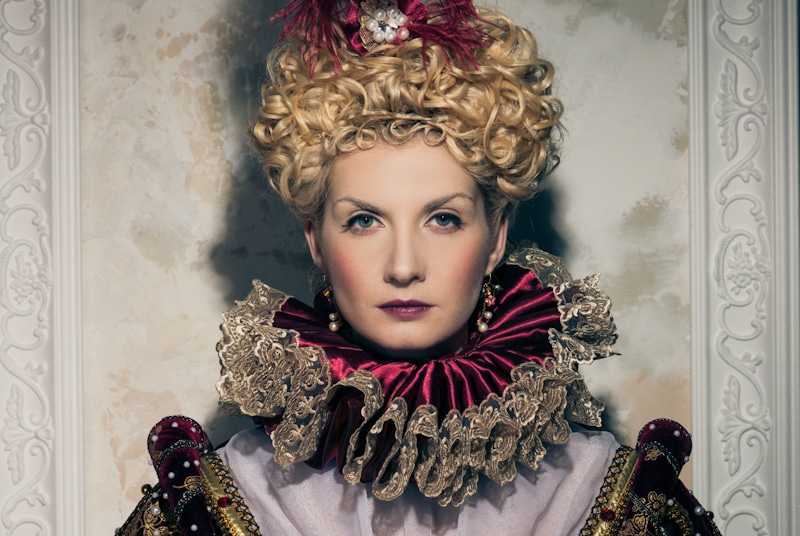Some titles or ranks may confuse us over time because they seem similar. Sometimes we don’t know which one is higher or who responds to who.
An empress is a ruler, the wife, or the mother of the ruler of an empire. A queen has a kingdom. An empire is supposed to be bigger than a kingdom. Both are monarchs, but the Empress has a higher title.
To understand ranks and titles, first, we have to understand hierarchy, which is a system that organizes or ranks things, often according to importance or power.
What Is Hierarchy?
As mentioned earlier, it is a system that organizes things in importance or power order. It is a formal or implied power structure, where people understand what is important or who is on top.
Almost everything in our daily lives has a hierarchy. Some of them are organized by importance, for example, during our work lives when we get a request from our manager. Similarly, we occasionally sort things out according to price when shopping. In that situation, there can be a quality hierarchy. It comes to mind that we group our favorite items based on their quality or pricing.
In empires and kingdoms, there are other names for the same rank. Listed below are some general knowledge points that I want to share with you.
- In English, the earliest meaning of “hierarchy” relates to the ranks of different angels in the celestial order.
- The word hierarchy relates to several governmental words in English, like anarchy, monarchy, and oligarchy.
- It comes from the Greek “hierarchēs,” which was formed by mixing the words “hieros,” meaning “supernatural, holy,” and Archos, “ruler.”
- “Hierarchy” has proceeded to expand its meaning beyond governmental and ecclesiastical matters.
- In today’s society, it’s used in several different kinds of graded classifications.
What Is An Empire?
It is a sovereign state ruled by a single authority, often called the Emperor or Empress. The state is made up of several territories. An empire can be made entirely of contiguous territories.
What is a kingdom?
It is a territory ruled by a King or a Queen. It is one of the earliest forms of societies globally, having existed for thousands of years. One big example of a kingdom is “The United Kingdom,” ruled by Queen Elizabeth II since 1952.
Imperial Titles
- “Emperor,” from Latin, ‘imperator,’ was originally a military. In English, the feminine term is Empress. They rule an Empire. Other words meaning emperor include:
- Caesar, in relation to the Roman dictator Julius Caesar, whose adopted son “Gaius Julius Caesar Augustus,” became the first emperor of Rome.
- Kaiser: derived from Caesar, used initially in Germanic countries.
- Shehenshah: the Gurkani Dynasty from the Mughal Empire.
- Otumfuo: this one means “the Powerful One,” an Akan title meaning king of kings.
- Augustus: means “Majestic” or “Venerable,” used by Roman Emperors from the beginning of the empire.
- Basileus kai Autokrator: it means “sovereign and autocrat.” Used by the Roman emperors since the ninth century.
- Tsar / Tzar / Csar / Czar: is a short variant of Caesar’s Slavic pronunciation (tsyasar), the feminine term “Tsaritsa,” used in Bulgaria, Russia, and other Slavic countries.
- Huangdi (皇帝): In Imperial China, it meant the Imperial monarch.
- Samrat, (Sanskrit: samrāt or सम्राट) means “Universal lord, a paramount sovereign,” is an ancient Indian title whose feminine form is “Samrājñī or साम्राज्ञी.”
- Chhatrapati (Devanagari: छत्रपती) used by Maratha ruler Shivaji is his title in Early Modern India.
- Tennō (天皇): In Japanese, this means “heavenly sovereign.” It is the representation of the state and the unity of the people.
- Tsenpo: This was the title of the emperors of the Tibetan Empire. There were also known as “Ihase” or “Divine Son.”
- Chanyu: This was a title used by supreme nomadic rulers of Asia. It means “Son of Heaven, Ruler of the North.”
Royal titles
- King: It roughly means “Son of the people.” It comes from the Germanic *kuningaz.”
- Rex: It means “ruler” in Latin.
- Basileus. It means “chieftain.” Used by several ancient Greek rulers.
- Negus is an Ethiopian royal title.
- Arka: In Great Armenia, it is a royal title (King).
- Tagavor is a royal title (King) in Great Armenia along with Melech.
- Wang (王). In ancient China, it meant “the head of state.”
- Rana: For Rajput rulers on the Indian subcontinent, this was a title for martial sovereignty.
- Deshmukh: “ruler and king” in Marathi
- Khan: At first, it was initially a military rank. It comes from the Turco-Mongol word “lord.”
- Kabaka: This was used by the King of Buganda, a region within Uganda in East Africa.
- Sultan: From Arabic and initially referring to the one who had “power.” Recently it was used as a synonym for “King.”
- Malik: Means King in Arabic.
- Tuanku: Is the title of the kings of the nine Royal states of Malaysia. It means “My Master.”
- Mwami: used in Rwanda and the surrounding regions of Congo.
- Susuhunan: Is a title of the Javanese monarch of the Surakarta Sunanate. It means “he to whom homage is paid.”
- Lugal: It is the term for “king, ruler” in Sumerian. The word means “big man.”
- Queen, from the Germanic *kwoeniz, or *kwenon, “wife”; The female term of a King, or the wife of a King; A kingdom is the realm of both king and queen.
- Rani: Queen in Hindi.
- Shahbanu: It means “Queen” in Persian.
- Sultana: It means “Queen” in Arabic.
- Malika: It means “Queen” in Arabic.
- Joō (女王): It means “female sovereign” in Japanese.
- Malka: It means “Queen” in ancient Hebrew.
Origin Of “Empress” And “Queen”
Empress is a: “woman who rules over an empire.” It comes from the 12 century, “emperice,” and from Old French “emperesse.”
It is the female equivalent of “emperor.”
An emperor is a monarch and the ruler of an empire.
Queen is a woman who rules a kingdom because she has been born into a royal family or is married to a king. It comes from Middle English “quene,” “consort of a king, pre-eminent female noble,” and “female sovereign, a woman ruling in her own right.”
Both terms can confuse us because they refer to female figures with a high hierarchy and power over a nation. But one of them covers more territory than the other and also has more power.
I will share some other words that people call a queen or an empress in the following part. In some cases, the same word is used when referring to either of them.
Other words for queen
Queen
- Monarch.
- Ruler.
- Consort.
- Regent.
- Female ruler.
- Female sovereign.
- Queen Dowager.
- Crowned head
Other words for Empress
Empress
- Ruler
- Monarch
- Sovereign
- Lady
- Potentate
- Tsarina
- Crowned head
Conclusion
As we have seen, both terms refer to the feminine counterpart of a ruler. The empress relates to the emperor, and the queen is related to the king.
The empress can be related to the empire in many ways. For instance, serving as a ruler, as the wife of an emperor, or as the mother of an emperor. The queen can be related to the kingdom as a ruler or as the wife of the king.
In both cases, their role is significant to society. Being the highest-ranked female part of a region is a high responsibility. However, in ranking terms, a kingdom is down in importance to an empire. In fact, an empire can have several kingdoms that have to pay tribute to them. In other words, an Emperor or Empress can have several Kings and Queens paying tribute to them or be restrained in their actions in some uneven fashion. An emperor or empress should, in theory, be completely independent of such restrictions. They are considered a more important monarchical title.
Both “empresses” and “queens.” are significant figures in their territories and work very hard. So, let’s be like them and work very hard for what matters most to us.
Shawn Manaher is the founder and CEO of The Content Authority. He’s one part content manager, one part writing ninja organizer, and two parts leader of top content creators. You don’t even want to know what he calls pancakes.



